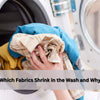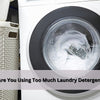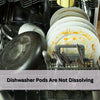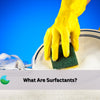Is Your Dishwasher Tablet Doing More Harm Than Good?
- by Brodie Cook

Hey there, let's talk about those little pods you pop in your dishwasher. They seem so handy, right? Just toss one in the dispenser, close the door, and run a cycle. But wait a second. What if these easy-to-use dishwasher tablets aren't all they're cracked up to be?
In this post, we'll look at 10 reasons why you might want to ditch those tablets. From saving money to protecting your health and the planet, there's a lot to consider. So, let's see why your trusty dishwashing tablets might not be your best kitchen buddy after all!
1. Environmental Concerns: Microplastic Pollution

Dishwasher tablets might be hurting our environment more than we think. Each pod often comes in a tiny plastic wrap. This wrap is meant to dissolve, but it doesn't always break down fully in the wash cycle.
When it doesn't break down, it becomes tiny bits of plastic called microplastics. These bits end up in our water and soil. Even the tablets that seem to dissolve can leave behind harmful residue on our dishes and also at the bottom of the dishwasher. Research shows that up to 75% of PVA (polyvinyl alcohol) from detergent pods can end up in oceans and soil (ASU News). So, every time we use a tablet to clean our dishes, we're adding to this problem. It's something to think about next time you're loading up your machine!
2. Potential Damage to Gut Health
Ever worry about what's left on your "clean" dishes? Well, you should. Some chemicals in dishwasher tablets, like alcohol ethoxylates, can mess with your gut health. They can break down the protective barrier in your gut if any residue is left on your plates or glasses. When it's damaged, all sorts of problems can start. Over time, this might lead to chronic health issues (New Atlas). It's like inviting unwanted guests into your body whenever you eat off those items!
But why does this matter so much? Well, your gut isn't just about digesting food. It's connected to your overall health in ways you might not expect. A healthy gut helps your immune system, affects your mood, and even influences your brain function. When those dishwasher tablet chemicals disrupt your gut, they're not just causing tummy troubles. They could be setting the stage for bigger health problems down the road. You shouldn't have to worry about your dishwashing routine making you sick!
3. Cost Inefficiency

Let's talk about your wallet. Dishwasher tablets might be costing you more than you think. When you break it down, each wash cycle with a tablet is pricier than using powder or liquid detergent.
But what about those fancy, expensive tablets? Surely they clean better, right? Well, not always. Tests show that pricey tablets don't always work better than cheap ones. Plus, their individual wrapping and concentrated formulas make them less cost-effective in the long run (Ethical Consumer). It's like buying a platinum spoon when a regular one works just fine. Why waste money when you don't have to? You've got better things to spend your hard-earned cash on than overpriced soap!
4. Limited Flexibility for Different Wash Cycles
Ever tried to use a tablet for a quick wash? It might not finish the job as well as you'd hope. Tablets take time to dissolve, especially in cold water. In short cycles, they might not break down fully at the bottom of the dishwasher. This means your items might not get as clean as you want.
What about small loads? Tablets can be a problem here too. You can't break them in half easily. So, you end up using a whole pod for just a few dishes. It's like using a sledgehammer to crack a nut - too much for the job! With tablets, you're stuck using the same amount no matter how big or small your load is.
5. Pipe and Filter Clogging Risks

Did you know your dishwasher tablets might be causing trouble for your machine? Some people experienced that these tablets can lead to clogging in pipes and filters. How? Well, they often contain more soap than needed (Ozbargain). This extra detergent doesn't just rinse away.
Over time, it can build up in your dishwasher's parts. This gunk can block pipes and clog filters. It's like cholesterol in your arteries - not good! If this keeps happening, it could hurt your dishwasher in the long run. You might end up needing a repairman or even a new dishwasher sooner than you should. That's a big price to pay for using tablets! Plus, all that soap residue can leave a funky smell in your machine. Not exactly the fresh, clean scent you're after, right?
6. Harmful to Aquatic Life
Your dishes might be clean, but what about our rivers and oceans? The chemicals in dishwasher tablets, like surfactants, phosphates, and chlorine, can harm marine life in ways you might not expect. These substances don't just disappear after they go down the drain. They make their way through our water systems and end up in natural water bodies.
Once there, they can mess up how aquatic plants grow and can be toxic to fish and other water creatures (Tru Earth US). It's like we're cleaning our plates but dirtying our planet's waters at the same time.
You wouldn't pour these chemicals directly into a fish tank, would you? So why risk it with our larger water ecosystems? We've got to think beyond our kitchen sink!
7. Packaging Waste and Non-Biodegradability
Those shiny wrappers around your dishwasher tablets? They're not as eco-friendly as you might think. Many are made of polyvinyl alcohol (PVA), which comes from fossil fuels. This material is designed to dissolve in water, which sounds great in theory. But here's the catch: even when they say "biodegradable" on the package, research shows that a lot of it doesn't break down in normal water treatment (ASU News).
So, we're not just using the tablet - we're adding to the world's plastic problem with every wash cycle. It's like tossing a tiny bit of plastic into the ocean each time we run a load. And don't forget, each tablet comes individually wrapped, which means more packaging waste overall compared to powder or liquid detergents. You'll end up with a lot of empty plastic containers that aren't easy to recycle.
8. Contains Toxic Chemicals
What's really in those little pods? Often, it's more than just soap. Dishwasher tablets can contain artificial preservatives, dyes, and binding agents. These chemicals can release harmful stuff into the environment. Worse, they might leave residues on your dishes, potentially contaminating your food (Attainable Home). It's like seasoning your meals with a dash of chemicals - not exactly appetizing, right?
Some of these chemicals, like chlorine bleach and phosphates, are tough on stains but can be harmful to your health and the environment. Even fragrances can cause allergies. The problem is, that these chemicals don't always rinse away completely. They might stick around on your plates and glasses, meaning you could be eating more than just your meal. Something to consider next time you reach for that tablet! You shouldn't have to worry about chemical residues when you're just trying to enjoy your dinner.
9. Potential for Allergen Exposure
Got allergies? Your dishwasher tablets might be making them worse. Some ingredients in these tablets, like fragrances and dyes, can trigger allergies or skin irritations. Even after a full rinse, these allergens can stick around on your dishes (GutHealth.org). So, you might be serving up a side of sneezes with your dinner without even knowing it.
These hidden allergens aren't just a problem when you're eating. They can also affect you when you're handling the dishes or breathing in the steam from a just-finished dishwasher cycle. For people with sensitive skin or respiratory issues, this constant low-level exposure could lead to ongoing discomfort. It's like having an invisible irritant in your kitchen that you can't see but your body notices.
10. Contribution to Greenhouse Gas Emissions
Ever thought about the journey your dishwasher tablet takes before it reaches your home? The production, packaging, and transportation of these tablets add up to higher CO2 emissions compared to simpler options like powder detergents (Ethical Consumer). It's like each little tablet has its own carbon footprint - and it's bigger than you might think.
From the energy used in manufacturing to the fuel burned in shipping, these tablets have a hidden environmental cost. Their individual packaging requires more materials and energy to produce than bulk options. Plus, their compact nature means more trips to restock, adding to transport emissions. While one tablet might seem small, when millions of households use them, the impact adds up fast. It's another way these convenient cleaners might be less eco-friendly than they appear.
Final thoughts

So, what do you think? Maybe it's time to take a fresh look at how you use your dishwasher. Why not try something new? There are options out there that are better for you, your wallet, and the planet.
Here's an idea: Give our dishwashing detergent a shot. They're safe for septic tanks and don't have harsh stuff like bleach or phosphates. One pack gives you 80 washes, and you can use them in lots of ways. Toss them in the dishwasher, use them in the sink, or even for tough, stuck-on grease. For our dishwashing sheets, we use plastic free packaging! Why not make a small change that could make a big difference? You've got nothing to lose, except maybe some stubborn stains!

 Dishwashing
Dishwashing Laundry
Laundry Bundles
Bundles Surfaces
Surfaces Toilet
Toilet Handsoap
Handsoap Multi-Purpose
Multi-Purpose Floor
Floor



